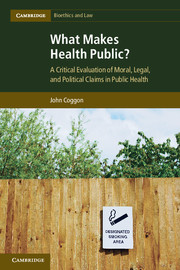 What Makes Health Public?
What Makes Health Public? Book contents
- Frontmatter
- Contents
- Foreword
- Acknowledgements
- What makes health public?
- Part I Basic concepts in public health
- 1 Health, normativity, and politics
- 2 The public, and things being public
- 3 The seven faces of public health
- 4 Public health policy
- 5 Public health law and ethics
- 6 Conclusion to Part I
- Part II Evaluating evaluations: making health public
- Part III Tackling responsibility: liberal citizens as subjects and sovereigns
- Bibliography
- Index
- References
2 - The public, and things being public
from Part I - Basic concepts in public health
Published online by Cambridge University Press: 05 June 2012
- Frontmatter
- Contents
- Foreword
- Acknowledgements
- What makes health public?
- Part I Basic concepts in public health
- 1 Health, normativity, and politics
- 2 The public, and things being public
- 3 The seven faces of public health
- 4 Public health policy
- 5 Public health law and ethics
- 6 Conclusion to Part I
- Part II Evaluating evaluations: making health public
- Part III Tackling responsibility: liberal citizens as subjects and sovereigns
- Bibliography
- Index
- References
Summary
Introduction
The ‘public’ in ‘public health’ evokes different messages in different audiences. For normative analysts, reference to ‘public’ is a reminder that evaluation of health-related matters must take place in a political and social context; a reminder that there is no use in simply identifying issues as they would relate to two abstracted individuals in their own discrete universe, as may (unhelpfully) happen in medical ethics. Given the importance of the term ‘public’ in debates in public health law and ethics, further conceptual clarity is needed. Although the ‘public’ in public health takes its adjectival form, our focus may fall on ‘the public’ too. An analyst may claim to be concerned by the health of the public or a public, as well as by the public aspects of people’s health. In regard to the former, we may then want to consider what the public is: is it some entity that is more than the sum of its parts, or is it just the aggregate of people it comprises? In regard to the latter, we might note that there may be overlapping, even universal, health-related issues that are not fair game for policy measures, unwanted third party interference, or as the basis of claims seeking to establish health-based rights or duties. Furthermore, the ‘public’ in public health may be considered as an administrative qualifier, referring to the work of government, or even specific agencies within government.
The extent to which matters are public, in some senses, depends on the extent to which they are not purely of concern to the individual; put positively, the extent to which they are all citizens’ ‘business’. To be this does not mean simply that people have similar or overlapping concerns, for example that they are all equally susceptible to the risk of a form of cancer, but that each person’s susceptibility is also everybody else’s concern. Establishing robust answers to these questions is an endeavour in political philosophy. Part II of the book considers a range of frameworks for such analytic assessment, ranging from the apolitical, wherein there is no public, to the strongly communitarian, wherein a concept of public is of great importance. Here I am concerned to establish the important conceptual groundwork to allow such analysis. The current chapter therefore explores ‘public’ as a noun and as an adjective, and presents the concepts around which analysis will most usefully be framed. I begin by considering ‘the public’, and note its association with a collective of citizens; a shared community. The implications of this are necessarily political, and expose the proper nature of our critical assessment. I then consider the public/private distinction, assessing its validity and utility. Before concluding, I note two senses of ‘public’ as it features in matters relating to public health, discussed in an influential paper by Angus Dawson and Marcel Verweij. As public health of necessity focuses our attention on the idea that ‘public’ is of significance, it is crucial to consider what it might mean.
- Type
- Chapter
- Information
- What Makes Health Public?A Critical Evaluation of Moral, Legal, and Political Claims in Public Health, pp. 24 - 44Publisher: Cambridge University PressPrint publication year: 2012
